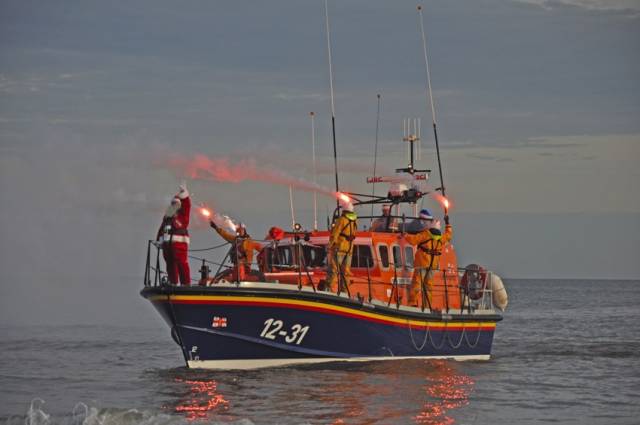#RNLI - Clogherhead RNLI has looked back on 2016 and paid tribute to all those who made it such a memorable year for the lifeboat station and its volunteers.
Throughout the year the station worked with other community groups and organisations to promote their work and the Co Louth coastal village, resulting in a busy calendar of events and successful partnerships.
But it was also an eventful year on the water, with lives saved — and sadly lost, too.
Back in March the lifeboat was launched to reports of a distress signal from a fishing vessel located 25 miles east of Clogherhead, recovering its liferaft and beacon after the coastguard winched its three fishing crew to safety.
Later that month, RNLI volunteer lifeboat crew from across Ireland took part in the Easter 1916 centenary commemoration which saw over 700 members of the Irish emergency services taking part in the biggest parade in the history of the state.
Fifty RNLI volunteers came from 29 lifeboat stations around the country to parade through Dublin city centre to mark the centenary. The RNLI formed part of the emergency services section of the parade which recognised the ‘blue light’ agencies serving the Irish State since its foundation.
Representing Clogherhead RNLI was volunteer shore crew member Carolyn Stanley — granddaughter of Joe Stanley, Pádraig Pearse’s press agent and printer.
During the Easter Rising, Pearse relied on Stanley to convert his handwritten communiques into printed documents for onward circulation throughout the city. It was Stanley who published the first documents of the newly proclaimed republic.
In June, four Louth volunteers were honoured at the annual RNLI Awards, held in the Guinness Storehouse, for their contribution to the charity.
Brendan Hoey received a Bar to Gold Badge for his 30 years of volunteering, while Anne Levins, Terry Rath and Deirdre Delaney received Gold Badges for their outstanding contribution to volunteering.
Between them, these volunteers have given thousands of hours to the RNLI, working hard to raise awareness and funds for the work of the charity in Clogherhead.
In July, Clogherhead RNLI threw open its doors to welcome the community in for their annual open day, which enjoyed a record-breaking attendance.
Another highlight of the year was Clogherhead RNLI’s involvement in the Pride of Place competition along with many other community groups and speakers.
The ‘Community Oscars’ saw Clogherhead top the prestigious Island and Coastal Community category. The station was proud to be part of the submission and spoke about their work and involvement in the community highlighting their history and life-saving work.
The summer also saw the Drogheda Maritime Festival take place, and the Clogherhead volunteers brought their all-weather lifeboat down to the quayside.
They also welcomed some VIPs from Belarus, regular visitors to Ireland with the Chernobyl Children’s Charity, to their stand and onboard the lifeboat for a personal tour.
Each year Clogherheard RNLI station mechanic Padraig Rath helps the charity organise the St Stephen’s Day Swim on Clogherhead beach, which last year raised €6,000 for a building project to rehouse children living in institutions.
Sadly the year was not without tragedy, when local man and diver Craig Byrne lost his life in September. The whole village was in mourning, and Craig is remembered with great affection. The thoughts and sympathies of everyone with Clogherhead RNLI are with his family and loved ones.
As the year draws to a close and a new one beckons, Clogherhead RNLI found themselves rescuing Santa Claus and landed him on the beach to be met by local school children.
This followed the popular ‘Polar Plunge’ which was held for Special Olympics on Clogherhead beach and where the lifeboat station was operations hub on the day.
The team will once again round out the year supporting the Chernobyl Swim on St Stephen’s Day. This will be the 16th annual swim and funds raised will assist with the treatment of Chernobyl heart syndrome — a life-threatening condition affecting 6,000 children each year.
































































